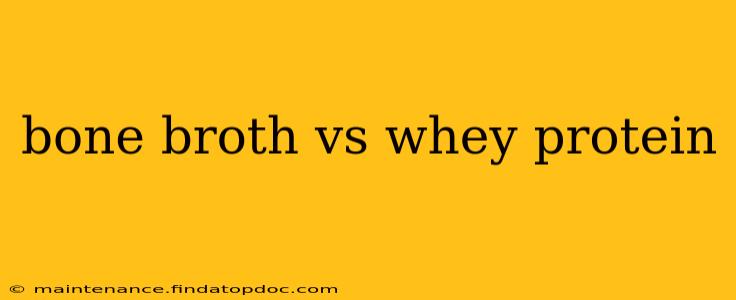Choosing between bone broth and whey protein often hinges on individual health goals and dietary preferences. Both offer unique nutritional benefits, but they cater to different needs and serve distinct purposes. This detailed comparison explores their nutritional profiles, health benefits, potential drawbacks, and ideal use cases to help you make an informed decision.
What is Bone Broth?
Bone broth is a nutrient-rich liquid made by simmering animal bones, often including marrow, cartilage, and connective tissue, in water for an extended period. This slow cooking process extracts valuable minerals, collagen, and gelatin, resulting in a savory, flavorful broth. It's been a dietary staple for centuries and is experiencing a resurgence in popularity due to its purported health benefits.
What is Whey Protein?
Whey protein is a byproduct of cheese production. It's a complete protein, meaning it contains all nine essential amino acids your body can't produce on its own. Whey protein supplements are widely popular among athletes and fitness enthusiasts for their ability to support muscle growth and recovery. It's available in various forms, including concentrate, isolate, and hydrolysate, each differing in its processing and protein content.
Bone Broth Nutritional Profile: A Rich Source of Minerals & Collagen
Bone broth is low in calories and fat but surprisingly rich in:
- Minerals: Calcium, magnesium, phosphorus, potassium, and trace minerals like zinc and manganese.
- Collagen: A protein crucial for joint health, skin elasticity, and gut health. It breaks down into gelatin during the simmering process.
- Amino Acids: Glycine, proline, and glutamine, which support various bodily functions.
- Gelatin: Provides structure and contributes to satiety.
Whey Protein Nutritional Profile: High in Protein, Essential Amino Acids
Whey protein is primarily known for its high protein content, typically ranging from 20-30 grams per serving. It's also a source of:
- Essential Amino Acids: Including leucine, isoleucine, and valine, crucial for muscle protein synthesis.
- Branched-Chain Amino Acids (BCAAs): Support muscle growth and reduce muscle soreness.
- Lactose: Depending on the type of whey protein (isolate contains less lactose than concentrate).
Bone Broth Health Benefits: Gut Health, Joint Support, and More
- Improved Gut Health: The gelatin and amino acids in bone broth can help soothe the digestive tract and improve gut lining integrity.
- Joint Support: Collagen contributes to cartilage health, potentially reducing joint pain and inflammation.
- Enhanced Skin Health: Collagen promotes skin elasticity and hydration.
- Stronger Bones: The minerals in bone broth support bone health.
- Improved Sleep: Glycine, an amino acid found in bone broth, may promote better sleep quality.
Whey Protein Health Benefits: Muscle Growth, Recovery, and Weight Management
- Muscle Growth and Repair: Whey protein provides the building blocks for muscle protein synthesis, essential for muscle growth and recovery after exercise.
- Increased Satiety: High protein content contributes to feeling full and satisfied, aiding weight management efforts.
- Improved Immune Function: Whey protein contains immunoglobulins, which can support immune function.
- Increased Strength and Performance: Studies suggest whey protein can improve athletic performance.
Bone Broth vs. Whey Protein: Which is Right for You?
This depends heavily on your goals:
- For joint health, gut health, and overall well-being: Bone broth is an excellent choice.
- For muscle growth, recovery, and increasing protein intake: Whey protein is the better option.
What are the downsides of bone broth and whey protein?
Bone Broth:
- Potential for Contaminants: Bone broth made from lower-quality sources may contain contaminants. Choose reputable sources.
- High Purine Content: May not be suitable for individuals with gout.
- Not a Complete Protein: Lacks all essential amino acids compared to whey.
Whey Protein:
- Lactose Intolerance: Whey protein contains lactose, potentially causing digestive issues in those with lactose intolerance. Whey protein isolate is a better option for these individuals.
- Potential for Allergic Reactions: Some individuals are allergic to whey protein.
- May Cause Digestive Upset: Consuming large amounts may lead to bloating, gas, or diarrhea.
Is bone broth a good source of protein?
While bone broth contains amino acids, it's not considered a significant source of protein compared to whey protein. It provides a moderate amount of protein, but it is primarily valued for its minerals and collagen content.
Does bone broth build muscle?
Bone broth does not directly build muscle in the same way whey protein does. Whey protein's high concentration of amino acids is ideal for muscle protein synthesis. Bone broth offers supporting nutrients for overall health, which contributes indirectly to muscle health.
Can I take bone broth and whey protein together?
Yes, you can consume bone broth and whey protein together. They offer distinct benefits and don't typically interact negatively. However, be mindful of your overall daily protein and calorie intake.
By understanding the unique benefits and drawbacks of each, you can incorporate bone broth and whey protein strategically into your diet to support your individual health goals. Remember to consult with a healthcare professional or registered dietitian before making significant changes to your diet, especially if you have underlying health conditions.
